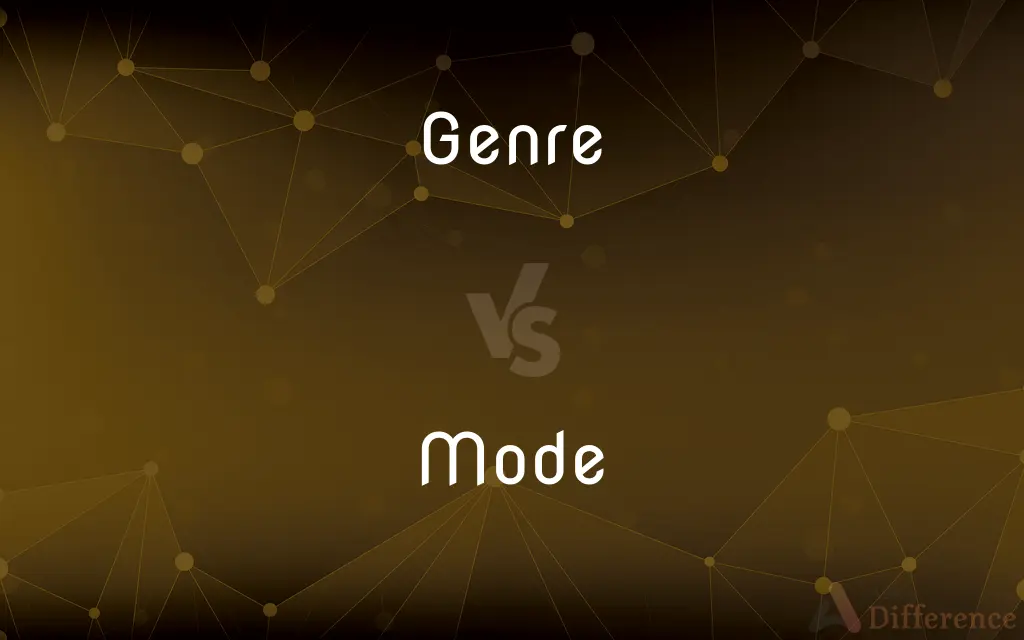Genre vs. Mode — What's the Difference?
Edited by Tayyaba Rehman — By Fiza Rafique — Updated on May 18, 2024
A genre is a category of artistic composition characterized by similarities in form, style, or subject matter, while a mode refers to a particular manner or method of artistic expression within any genre, focusing on style, tone, or approach.

Difference Between Genre and Mode
Table of Contents
ADVERTISEMENT
Key Differences
A genre is a classification system used in literature, music, film, and other art forms to categorize works based on shared characteristics. A mode, on the other hand, refers to a specific way or method of expressing artistic content within any genre. Modes can include narrative styles, tones, or thematic approaches.
Genres provide the structural foundation and thematic elements that define a category of work. In contrast, modes offer flexibility in how those elements are presented, allowing for variation in style and tone within the same genre. For example, a science fiction novel (genre) can be written in a dystopian mode or a utopian mode, affecting the story's outlook and tone.
Genres are generally broad categories that encompass numerous works, while modes are more specific and can be applied across different genres to achieve a particular artistic effect. Understanding the distinction helps in analyzing and appreciating the nuances of artistic works.
Comparison Chart
Definition
Category based on form, style, or subject matter
Manner or method of artistic expression
Examples
Mystery, Romance, Science Fiction, Horror
Humorous, Tragic, Satirical, Ironic
ADVERTISEMENT
Function
Classifies works into recognizable groups
Influences style, tone, and delivery
Scope
Broad and general
Specific and variable within genres
Application
Literature, Music, Film, Art
Any genre
Focus
Structural and thematic elements
Presentation and perception
Compare with Definitions
Genre
A category of film defined by common themes.
Horror movies aim to evoke fear and suspense.
Mode
A specific way of expressing content within any genre.
The novel was written in a humorous mode, making light of serious situations.
Genre
A category of music with specific stylistic traits.
Jazz music is known for its improvisational elements.
Mode
Affects the tone and mood of the work.
The satirical mode was used to critique societal norms through irony and wit.
Genre
A category of literature with distinct characteristics.
Mystery novels often involve a detective solving a crime.
Mode
Defines the manner of delivery.
The epic mode in poetry often involves grand themes and heroic characters.
Genre
Helps audiences select works they are likely to enjoy.
Fans of the romance genre look for stories about love and relationships.
Mode
Shapes the audience's perception.
The narrative used an ironic mode to present a stark contrast between appearance and reality.
Genre
A broad categorization based on form and content.
The genre of science fiction explores futuristic concepts and technology.
Mode
A manner, way, or method of doing something, experiencing something, or acting
Modern modes of travel.
Modes of consciousness.
Modes of affection.
Genre
{{Genres is an Advertising Company based in Berhampur, Odisha, India. headed by young and talented people.
Mode
A particular form or kind
The building has multiple modes of egress.
Genre
A category of artistic composition, as in music or literature, marked by a distinctive style, form, or content
"his six String Quartets ... the most important works in the genre since Beethoven's" (Time).
Mode
A given condition of functioning; a status or operation
The spacecraft was in its recovery mode.
Genre
A realistic style of painting that depicts scenes from everyday life.
Mode
The current or customary fashion or style
A hat in the latest mode.
Genre
A type or class
"Emaciated famine victims ... on television focused a new genre of attention on the continent" (Helen Kitchen).
Mode
Any of certain fixed arrangements of the diatonic tones of an octave, as the major and minor scales of Western music.
Genre
A kind; a stylistic category or sort, especially of literature or other artworks.
The still life has been a popular genre in painting since the 17th century.
This film is a cross-genre piece, dark and funny at the same time.
The computer game Half-Life redefined the first-person shooter genre.
Mode
A patterned arrangement, as the one characteristic of the music of classical Greece or the medieval Christian Church.
Genre
Kind; genus; class; form; style, esp. in literature.
French drama was lisping or still inarticulate; the great French genre of the fabliau was hardly born.
A particular demand . . . that we shall pay special attention to the matter of genres - that is, to the different forms or categories of literature.
Mode
(Philosophy) The particular appearance, form, or manner in which an underlying substance, or a permanent aspect or attribute of it, is manifested.
Genre
A style of painting, sculpture, or other imitative art, which illustrates everyday life and manners.
Mode
See modality.
Genre
A kind of literary or artistic work
Mode
The arrangement or order of the propositions in a syllogism according to both quality and quantity.
Genre
A style of expressing yourself in writing
Mode
(Statistics) The value or item occurring most frequently in a series of observations or statistical data.
Genre
An expressive style of music
Mode
(Mathematics) The number or range of numbers in a set that occurs the most frequently.
Genre
A class of art (or artistic endeavor) having a characteristic form or technique
Mode
(Geology) The mineral composition of an igneous rock expressed in terms of percentage of the total sample weight or volume.
Mode
(Physics) Any of numerous patterns of wave motion or vibration.
Mode
(Grammar) Mood.
Mode
(music) One of several ancient Greek scales.
Mode
(music) One of several common scales in modern Western music, one of which corresponds to the modern major scale and one to the natural minor scale.
Mode
A particular means of accomplishing something.
What was the mode of entry?
Mode
A particular state of being, or frame of mind.
After a series of early setbacks, her political campaign is in crisis mode.
Mode
(statistics) The most frequently occurring value in a distribution
Mode
A state of a system that is represented by an eigenfunction of that system.
Mode
(computing) One of various related sets of rules for processing data; more generally, any state of the system associated with certain behaviours.
In insert mode, characters typed are directly inserted into the buffer.
Mode
(electronics) A series of settings on a device used for a specific purpose.
Airplane mode; night mode
Mode
(video games) A variation in gameplay, such as a difficulty level.
Mode
(grammar) A verb form that depends on how its containing clause relates to the speaker’s or writer’s wish, intent, or assertion about reality.
Mode
(philosophy) That which exists only as a quality of substance.
Mode
(textiles) In lace-making, a small decorative piece inserted into a pattern.
Mode
(textiles) The openwork between the solid parts of a pattern.
Mode
(obsolete) A woman's mantle with a hood.
Mode
Style or fashion; popular trend.
Her wardrobe is always in mode.
Mode
Manner of doing or being; method; form; fashion; custom; way; style; as, the mode of speaking; the mode of dressing.
The duty of itself being resolved on, the mode of doing it may easily be found.
A table richly spread in regal mode.
Mode
Prevailing popular custom; fashion, especially in the phrase the mode.
The easy, apathetic graces of a man of the mode.
Mode
Variety; gradation; degree.
Mode
Any combination of qualities or relations, considered apart from the substance to which they belong, and treated as entities; more generally, condition, or state of being; manner or form of arrangement or manifestation; form, as opposed to matter.
Modes I call such complex ideas, which, however compounded, contain not in them the supposition of subsisting by themselves, but are considered as dependencies on, or affections of, substances.
Mode
The form in which the proposition connects the predicate and subject, whether by simple, contingent, or necessary assertion; the form of the syllogism, as determined by the quantity and quality of the constituent proposition; mood.
Mode
Same as Mood.
Mode
The scale as affected by the various positions in it of the minor intervals; as, the Dorian mode, the Ionic mode, etc., of ancient Greek music.
Mode
The value of the variable in a frequency distribution or probability distribution, at which the probability or frequency has a maximum. The maximum may be local or global. Distributions with only one such maximum are called unimodal; with two maxima, bimodal, and with more than two, multimodal.
Mode
How something is done or how it happens;
Her dignified manner
His rapid manner of talking
Their nomadic mode of existence
In the characteristic New York style
A lonely way of life
In an abrasive fashion
Mode
A particular functioning condition or arrangement;
Switched from keyboard to voice mode
Mode
A classification of propositions on the basis of whether they claim necessity or possibility or impossibility
Mode
Verb inflections that express how the action or state is conceived by the speaker
Mode
Any of various fixed orders of the various diatonic notes within an octave
Mode
The most frequent value of a random variable
Mode
Influences how a story is told.
The tragic mode in the play highlighted the inevitability of the protagonist's downfall.
Common Curiosities
Can a work belong to multiple genres?
Yes, a work can blend elements from multiple genres, such as a romantic comedy combining romance and comedy genres.
Can a mode be applied to any genre?
Yes, modes can be applied across different genres to achieve specific artistic effects.
What are some common literary genres?
Common literary genres include mystery, romance, science fiction, fantasy, and horror.
Is genre more related to content or form?
Genre relates to both content and form, defining thematic elements and structural characteristics.
What is a mode?
A mode is a particular manner or method of artistic expression, focusing on style, tone, or approach.
How do genres and modes interact?
Genres provide the framework for categorizing works, while modes offer flexibility in how those works are expressed and experienced.
How does understanding genres and modes enhance appreciation of art?
Understanding genres and modes helps analyze and appreciate the diverse ways artists express themes and stories.
How do modes influence artistic works?
Modes affect how content is presented, impacting the style, tone, and perception of the work.
What are some examples of modes in literature?
Examples of modes include humorous, tragic, satirical, ironic, and lyrical.
Can the same story be told in different modes?
Yes, the same story can be told in various modes, changing how it is perceived by the audience.
What is a genre?
A genre is a category of artistic work characterized by specific form, style, or subject matter.
How do genres help in categorizing works?
Genres group works into recognizable categories based on shared characteristics, making it easier for audiences to find content they enjoy.
Are genres and modes mutually exclusive?
No, genres and modes are not mutually exclusive; they complement each other to enrich artistic expression.
Is mode more related to style or theme?
Mode is more related to style and tone, affecting the delivery and presentation of the theme.
What is an example of a genre and mode combination?
A science fiction novel (genre) written in a dystopian mode presents a bleak, futuristic society.
Share Your Discovery

Previous Comparison
Arrow vs. Bullet
Next Comparison
Constant vs. IncessantAuthor Spotlight
Written by
Fiza RafiqueFiza Rafique is a skilled content writer at AskDifference.com, where she meticulously refines and enhances written pieces. Drawing from her vast editorial expertise, Fiza ensures clarity, accuracy, and precision in every article. Passionate about language, she continually seeks to elevate the quality of content for readers worldwide.
Edited by
Tayyaba RehmanTayyaba Rehman is a distinguished writer, currently serving as a primary contributor to askdifference.com. As a researcher in semantics and etymology, Tayyaba's passion for the complexity of languages and their distinctions has found a perfect home on the platform. Tayyaba delves into the intricacies of language, distinguishing between commonly confused words and phrases, thereby providing clarity for readers worldwide.
















































